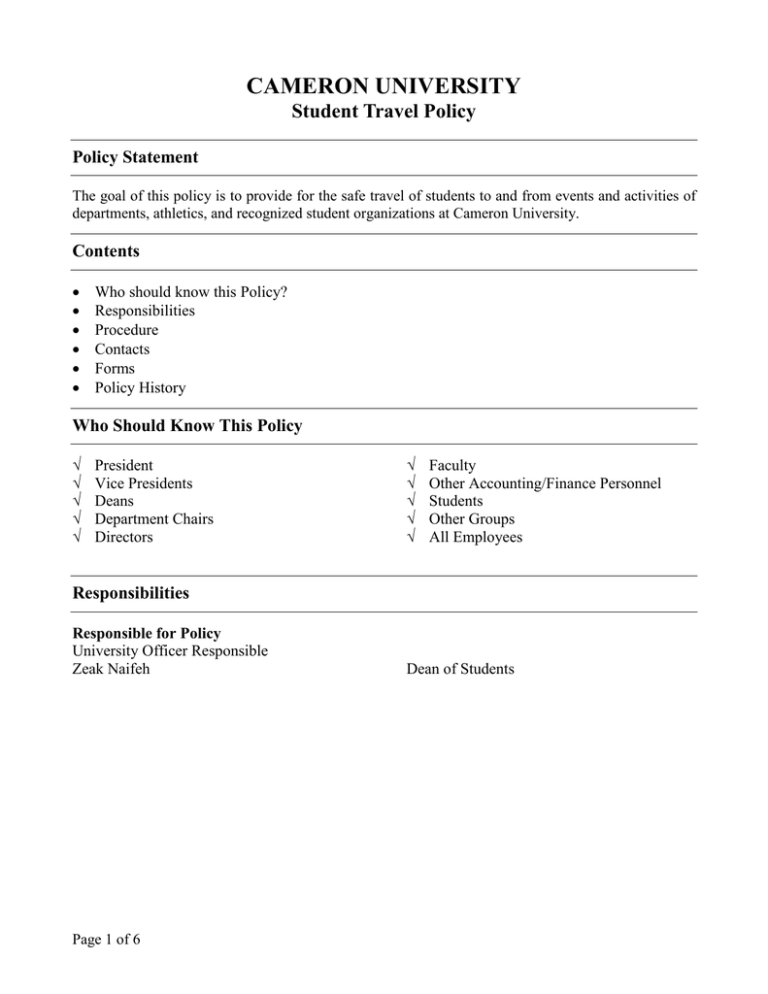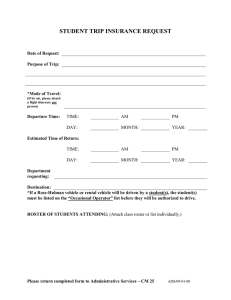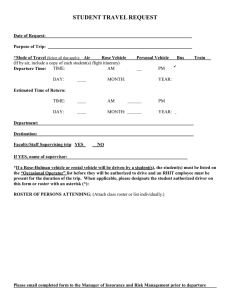CAMERON UNIVERSITY Student Travel Policy Policy Statement
advertisement

CAMERON UNIVERSITY Student Travel Policy Policy Statement The goal of this policy is to provide for the safe travel of students to and from events and activities of departments, athletics, and recognized student organizations at Cameron University. Contents • • • • • • Who should know this Policy? Responsibilities Procedure Contacts Forms Policy History Who Should Know This Policy √ √ √ √ √ President Vice Presidents Deans Department Chairs Directors √ √ √ √ √ Faculty Other Accounting/Finance Personnel Students Other Groups All Employees Responsibilities Responsible for Policy University Officer Responsible Zeak Naifeh Page 1 of 6 Dean of Students Procedure STATEMENT OF PURPOSE: The privilege to represent Cameron University throughout the state, nation and world is one of the many opportunities available to Cameron students. The university has established a travel registration process to promote the safety and welfare of students. 1.0 APPLICATION 1.1 The Student Travel Policy applies to student travel sponsored by a department or recognized student organization. 1.2 Specifically, these procedures are required when any of the following circumstances apply: • The event is funded by the University, • The travel is undertaken using a vehicle owned or leased by the University, • The activity or event is required or organized by a recognized student organization, or • The travel is undertaken under the scope, direction or election of a department, class, university office, learning community, study abroad program, recognized student organization, or their representatives. 1.3 It is the responsibility of the entity sponsoring organized student travel to assure compliance with this policy. 2.0 GENERAL TRAVEL REQUIREMENTS 2.1 Employees traveling on University business with students must be aware of and adhere to the University’s Travel Policies and Reimbursement Guidelines. 2.2 Access to current and accurate information is an essential factor in the University's ability to effectively respond to a critical incident involving Cameron students. In an effort to ensure individuals responsible for providing assistance have the information needed and all travel is documented, travel coordinators are responsible for completing the following steps prior to travel: • Complete and submit the Student Travel Authorization Request and Student Travel Roster at least 72 hours prior to departure for in-state travel, 10 days prior to departure for out-of state travel and at least two weeks prior to departure for international travel. These forms should be submitted to the Office of Student Services once appropriate signatures have been received. Forms for Department of Athletics travel should be submitted to the Director of Athletics. An updated Student Travel Roster and any changes to travel plans must be documented and submitted prior to departure. Information submitted should include the names, student identification numbers, and emergency contact information for each participant traveling. This information will be used by University staff members to assist student participants in case of an emergency. It is imperative that a correct and up-to-date list of participants and travel plans are available on campus. • Submit a Travel Request for Leave and Reimbursement for each faculty and staff member traveling with the students. • Obtain copies of Voluntary Assumption of Risk and Informed Consent forms for each participant prior to departure. These forms must be kept on file in the sponsoring department and maintained according to university records retention policies. In the instance of students Page 2 of 6 • • traveling frequently with a team to various competitions, only one copy needs to be on file for the duration of that particular competition season. For trips lasting more than 24 hours and/or requiring overnight lodging, student travel insurance must be purchased through the Office of Student Development or provide proof of comparable coverage. For trips of shorter duration, the trip sponsor may recommend requiring insurance. For rates and information, contact Student Development. For international travel, consult with the Office of Academic Affairs a minimum of six months prior to planned departure. Vice President for Academic Affairs approval is required for all international travel. Additional consent or waiver forms may be required. 2.3 The University requires that a Cameron faculty or staff member accompany students on University sponsored or organized travel event (See section 1.1 of the policy). A Cameron employee must be on call and available at all times during the travel to serve as an emergency contact. Prior approval must be granted before a University sponsored or organized travel event occurs without a Cameron employee traveling with the students. 2.4 All trip participants must comply with all laws, regulations, and University policies throughout the duration of the trip. 2.5 It is important that trip participants be made aware of details regarding the trip, and in many cases it may be necessary to have a meeting prior to departure in order to orient participants and set clear expectations. Both a pre-departure briefing and a post-trip debriefing are required for international travel. Consult with the Office of Academic Affairs to schedule these meetings for international travel. 2.6 The number of trip sponsors should be appropriate for the size of the group traveling. It may become necessary to limit the number of participants if appropriate supervision cannot be guaranteed. All trip sponsors should know the details of travel. 2.7 Prior to departure, the trip sponsor should gather applicable resources and information (i.e. weather forecast, evaluate travel warnings, locate nearest medical care and/or veterinarian care, acquire radios in the event of poor cellular service, locate additional water for animals, collect local embassy contact, contract with professional tour guide, etc.). In some instances, it may be prudent to send a trip sponsor in advance of the group to ensure that appropriate accommodations are made and available. 2.8 For high risk activities including adventure sports and snow sports, additional insurance is required. Information is available in the Office of Student Development. 3.0 TRAVEL SAFETY GUIDELINES FOR USE OF MOTORIZED VEHICLES 3.1. Vehicle Operator/Occupant Requirements 3.1.1 Any person operating a motorized vehicle while engaged in travel covered by this policy must be at least 18 years old and possess a valid operator’s license, as required by law, to operate the vehicle. 3.1.2 Operators shall comply with all laws, regulations, and posted signs or directions regarding speed and traffic control. 3.1.3 The following protocol is required to facilitate safe travel: • Operators must take a 30-minute rest break every four hours. Page 3 of 6 • • 3.2 Operators must drive no more than eight hours in a 24-hour period. Operators must be familiar with safety features including hazard signals, door locking and unlocking mechanisms, spare tire equipment and usage. • A navigator must be assigned for all trips scheduled to take more than two hours. The navigator must be awake and alert while on duty and sit in the front passenger seat. • Trips requiring more than 16 hours driving time to reach a destination require overnight lodging. Safety Requirements 3.2.1 Seat Belts–All occupants of motor vehicles shall properly use seat belts or other approved safety restraint devices required by law or regulations when the vehicle is in operation. 3.2.2 Capacity–The total number of drivers, occupants and luggage in any vehicle at any time during operation of the vehicle shall not exceed the manufacturer’s recommended capacity, or the number specified by University policy, or federal or state law or regulations, or the number of working seat belts, whichever is lowest. 3.2.3 Electronic Communication Devices–The driver of the motor vehicle shall not engage in the use of any hand held device, including cellular or mobile telephones, pagers, digital assistants, laptop computers, or any other electronic communication device while operating the vehicle. 3.3 University Owned, Leased, or Rented Vehicles 3.3.1 University owned vehicles may be made available for student travel. A request for use of a university owned vehicle must be indicated on the Travel Request for Leave and Reimbursement submitted by the department, and a copy of the processed Travel Request must be provided to the Office of Physical Facilities. Requests for use of University owned vehicles are handled by Physical Facilities on a case by case basis. 3.3.2 Recognized student organizations may use University vehicles providing a faculty or staff member will be driving the vehicle. 3.3.3 Student employees may operate a University motor vehicle in the course of their employment if they hold a valid driver’s license issued by their state/country of residence/origin. 3.3.4 Refer to the Employee Handbook, Section 11.13 regarding the use of state or university owned vehicles. 3.3.5 The use of 15-passenger vans for transporting University employees, students, visitors or guests is prohibited. Renting 15-passenger vans for the purpose of transporting University employees, students, visitors or guests is prohibited. 3.4 Privately Owned Vehicles 3.4.1 When requesting travel that involves the use of privately-owned vehicles, the University employee responsible for the trip shall verify current liability insurance for any vehicle to be used for the proposed travel and maintain a copy with the trip records. 3.4.2 The trip sponsor shall notify any driver operating a privately owned vehicle that his or her personal liability insurance policy must cover any liability that may result from the use of the vehicle for the proposed travel. It is the driver’s insurance that will be used to pay for damages to the vehicle(s) involved in an accident and/or injuries to a passenger or occupant of another vehicle. This is a large responsibility. If a driver is not comfortable with this responsibility, other transportation arrangements should be made. 3.4.3 Students will not drive other students to and from University sponsored events in privately owned vehicles. Page 4 of 6 3.4.4 University authorization is not required for student drivers for the following routine or recurring activities for which Cameron University does not ordinarily provide transportation: student teaching, practicums, internships, off-site instruction, and certain field research and service learning experiences. 4.0 TRAVEL SAFETY GUIDELINES FOR AIR TRAVEL Student air travel must be on scheduled commercial flights. 5.0 TRAVEL SAFETY INTERNATIONALLY 5.1 Cameron University students are not allowed to travel to or through a country with a U.S. Department of State Travel Warning in place restricting travel by U.S. citizens. 5.2 National standards for health and safety on trips abroad should be addressed by campus trip sponsors. Leaders from the departments or student organizations sponsoring organized travel outside the U.S. are required to gain approval from the Vice President for Academic Affairs at least six months prior to a planned departure date. Leaders must also complete a pre-departure briefing with the Office of Academic Affairs to gain training on safety, emergency procedures, crisis management and resources available to the group while abroad. Additional consent or waiver forms may be required. 5.3 GUIDELINES FOR STUDENTS TRAVELING 6.0 TEAM TRAVEL REIMBURSEMENT 6.1 The University may utilize Student Activity Fee revenue in funding student-related trips as prescribed in the Board of Regents Policy Manual, Section 4.11.1. 6.2 A separate Team Travel Reimbursement form must be completed for each trip with a list of students traveling and CU ID numbers. 6.3 Travel coordinators must provide itemized receipts and/or supporting documentation for each expenditure. Receipts must include the following information: • Name of Vendor • Number of Students • Date • City and State • Signature of person making request 6.4 Faculty and staff traveling as advisors must submit a Travel Request for Leave and Reimbursement and process their reimbursement according to section 11.10 of the Employee Handbook. 6.5 It is possible to secure a travel advance to cover purchases during the duration of the trip. Additional details are available in the Business Office. Page 5 of 6 7.0 ADDITIONAL PROCEDURES This policy is considered to be a minimum standard. Departments and/or student organizations may mandate additional standards as deemed necessary to address the unique travel situation. Contacts Policy Questions: Domestic Travel–Zeak Naifeh, Dean of Students, (580) 581-2244 International Travel–Anton Wohlers, Director of Academic Enrichment, (580) 581-2496 Travel Reimbursement–CU Business Office, (580) 581-2225 Vehicle Requests–Physical Facilities, (580) 581-2417 Forms In support of this policy, the following forms are included: Team Travel Reimbursement Form (T5) Student Travel Authorization Request (T6) Student Travel Roster (T7) Waiver and Release of Liability for Off Campus Activity (T8) Policy History Policy Issue Date: Reviewed, no revision: Revised: Page 6 of 6 January 2012 February 2016 September 2015


